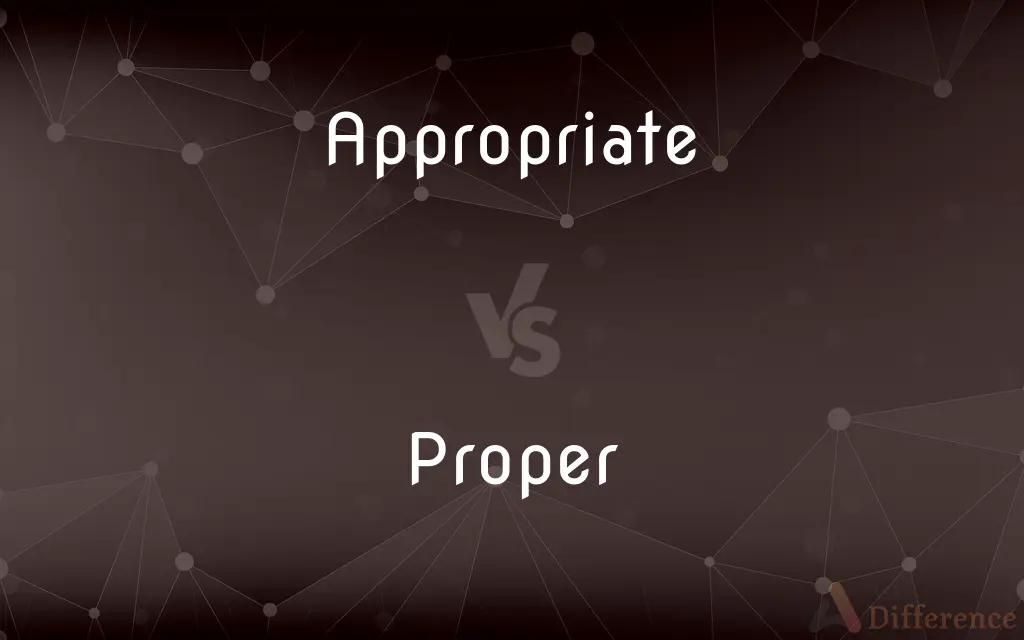Appropriate vs. Proper — What's the Difference?
By Fiza Rafique & Urooj Arif — Updated on March 26, 2024
Appropriate implies suitability for a specific context or use, while proper suggests conformity to established standards or norms.

Difference Between Appropriate and Proper
Table of Contents
ADVERTISEMENT
Key Differences
"Appropriate" refers to something suitable or fitting in a particular situation, context, or use. It emphasizes the idea of being right or acceptable for a specific circumstance without necessarily adhering to strict rules or standards. On the other hand, "proper" is often used to denote adherence to conventional standards, rules, or etiquette. It implies a sense of correctness according to social or formal norms.
While "appropriate" focuses on the suitability of an action, behavior, or choice in relation to the context or environment, "proper" emphasizes the correctness based on established practices or standards. For example, wearing a formal suit might be considered proper attire for a wedding, whereas wearing something comfortable yet respectful might be deemed appropriate for a casual office environment.
The distinction also lies in their usage in language. "Appropriate" can be used as both an adjective and a verb, indicating something is suitable or to allocate something specifically. "Proper," however, is predominantly used as an adjective to describe the quality of being right or suitable according to formal or social rules.
In terms of flexibility, "appropriate" allows for a broader interpretation based on the context, suggesting that something can be suitable in various ways. "Proper" tends to be more rigid, indicating that there is a specific way something should be done according to established norms or standards.
Both terms are used to guide behavior and choices, but "appropriate" is more about the fit or suitability in a given situation, while "proper" is about following established rules or standards. This difference is crucial in understanding cultural, social, and professional expectations and norms.
ADVERTISEMENT
Comparison Chart
Definition
Suitability for a specific context or use.
Conformity to established standards or norms.
Usage in Speech
Can be an adjective or a verb.
Predominantly an adjective.
Flexibility
Context-dependent and flexible.
More rigid and rule-based.
Focus
Suitability in relation to context or environment.
Correctness according to social/formal norms.
Examples
Choosing an appropriate topic for conversation.
Wearing the proper attire for a formal event.
Compare with Definitions
Appropriate
Suitable or fitting in a particular situation or context.
It's important to use appropriate language in professional settings.
Proper
Belonging or relating exclusively to a particular thing.
The document requires your proper signature.
Appropriate
Acceptable or proper in the circumstances.
Donating to charity is an appropriate way to help those in need.
Proper
Strictly adhering to traditional standards or etiquette.
A proper greeting involves a handshake in many cultures.
Appropriate
Matching or fitting in a particular context.
An appropriate response to a casual invitation might be a simple text.
Proper
Suitable or appropriate according to formal or social rules.
Formal events require proper attire.
Appropriate
Tailored to meet the needs of a specific situation.
Choosing an appropriate gift depends largely on the recipient's interests.
Proper
Exact; precise.
Please use the proper name when addressing the guest.
Appropriate
To set aside or allocate for a specific purpose.
The government appropriated funds for disaster relief.
Proper
Correct or suitable in a particular context.
Proper grammar is essential for clear communication.
Appropriate
Suitable for a particular person, condition, occasion, or place; fitting.
Proper
Denoting something that is truly what it is said or regarded to be; genuine
She's never had a proper job
A proper meal
Appropriate
To set apart for a specific use
Appropriating funds for education.
Proper
Of the required or correct type or form; suitable or appropriate
They had not followed the proper procedures
An artist needs the proper tools
Appropriate
To take possession of or make use of exclusively for oneself, often without permission
My coworker appropriated my unread newspaper.
Proper
Belonging or relating exclusively or distinctively to; particular to
The two elephant types proper to Africa and to southern Asia
Appropriate
Suitable or fit; proper.
The headmaster wondered what an appropriate measure would be to make the pupil behave better.
Proper
In the natural colours.
Appropriate
Suitable to the social situation or to social respect or social discreetness; socially correct; socially discreet; well-mannered; proper.
I don't think it was appropriate for the cashier to tell me out loud in front of all those people at the check-out that my hair-piece looked like it was falling out of place.
While it is not considered appropriate for a professor to date his student, there is no such concern once the semester has ended.
Proper
(of a person) good-looking
He is a proper youth!
Appropriate
(obsolete) Set apart for a particular use or person; reserved.
Proper
Denoting a subset or subgroup that does not constitute the entire set or group, especially one that has more than one element.
Appropriate
(transitive) To take to oneself; to claim or use, especially as by an exclusive right.
Let no man appropriate the use of a common benefit.
Proper
Satisfactorily or correctly
My eyes were all blurry and I couldn't see proper
Appropriate
(transitive) To set apart for, or assign to, a particular person or use, especially in exclusion of all others; with to or for.
A spot of ground is appropriated for a garden.
To appropriate money for the increase of the navy
Proper
The part of a church service that varies with the season or feast
We go to the High Mass, with plainsong propers sung by the Ritual Choir
Appropriate
To annex (for example a benefice, to a spiritual corporation, as its property).
Proper
Characterized by appropriateness or suitability; fitting
The proper knife for cutting bread.
Not a proper moment for a joke.
Appropriate
To make suitable to; to suit.
Proper
Called for by rules or conventions; correct
The proper form for a business letter.
Appropriate
Set apart for a particular use or person. Hence: Belonging peculiarly; peculiar; suitable; fit; proper.
In its strict and appropriate meaning.
Appropriate acts of divine worship.
It is not at all times easy to find words appropriate to express our ideas.
Proper
Strictly following rules or conventions, especially in social behavior; seemly
A proper lady.
A proper gentleman.
Appropriate
To take to one's self in exclusion of others; to claim or use as by an exclusive right; as, let no man appropriate the use of a common benefit.
Proper
Belonging to one; own
Restored to his proper shape by the magician.
Appropriate
To set apart for, or assign to, a particular person or use, in exclusion of all others; - with to or for; as, a spot of ground is appropriated for a garden; to appropriate money for the increase of the navy.
Proper
Characteristically belonging to the being or thing in question; peculiar
An optical effect proper to fluids.
Appropriate
To make suitable; to suit.
Proper
Being within the strictly limited sense, as of a term designating something
The town proper, excluding the suburbs.
Appropriate
To annex, as a benefice, to a spiritual corporation, as its property.
Proper
(Ecclesiastical) For use in the liturgy of a particular feast or season of the year.
Appropriate
A property; attribute.
Proper
(Mathematics) Of or relating to a subset of a given set when the set has at least one element not in the subset.
Appropriate
Give or assign a share of money or time to a particular person or cause;
I will earmark this money for your research
Proper
Worthy of the name; true
Wanted a proper dinner, not just a snack.
Appropriate
Take possession of by force, as after an invasion;
The invaders seized the land and property of the inhabitants
The army seized the town
The militia captured the castle
Proper
Out-and-out; thorough
A proper whipping.
Appropriate
Suitable for a particular person or place or condition etc;
A book not appropriate for children
A funeral conducted the appropriate solemnity
It seems that an apology is appropriate
Proper
Thoroughly
Beat the eggs good and proper.
Appropriate
Appropriate for achieving a particular end; implies a lack of concern for fairness
Proper
The portion of the liturgy that varies according to the particular feast or season of the year.
Appropriate
Meant or adapted for an occasion or use;
A tractor suitable (or fit) for heavy duty
Not an appropriate (or fit) time for flippancy
Proper
Suitable.
Appropriate
Suitable and fitting;
The tailored clothes were harmonious with her military bearing
Proper
Suited or acceptable to the purpose or circumstances; fit, suitable.
The proper time to plant potatoes
Appropriate
Being of striking appropriateness and pertinence;
The successful copywriter is a master of apposite and evocative verbal images
An apt reply
Proper
Following the established standards of behavior or manners; correct or decorous.
A very proper young lady
Proper
Possessed, related.
Proper
(grammar) Used to designate a particular person, place, or thing. Proper nouns are usually written with an initial capital letter.
Proper
Pertaining exclusively to a specific thing or person; particular.
Proper
In the strict sense; within the strict definition or core (of a specified place, taxonomic order, idea, etc).
Proper
Belonging to oneself or itself; own.
Proper motion — proper left — proper right
Proper
(heraldry) Portrayed in natural or usual coloration, as opposed to conventional tinctures.
Proper
(mathematics) Being strictly part of some other thing (not necessarily explicitly mentioned, but of definitional importance), and not being the thing itself.
Proper subset — proper ideal
Proper
Eigen-; designating a function or value which is an eigenfunction or eigenvalue.
Proper
Accurate, strictly applied.
Proper
Excellent, of high quality; such as the specific person or thing should ideally be. (Now often merged with later senses.)
Now that was a proper breakfast.
Proper
Attractive, elegant.
Proper
In the very strictest sense of the word.
Proper
Utter, complete.
When I realized I was wearing my shirt inside out, I felt a proper fool.
Proper
Properly; thoroughly; completely.
Proper
Properly.
Proper
(obsolete) Something set apart for a special use.
Proper
(Christianity) A part of the Christian liturgy that varies according to the date.
Proper
Belonging to one; one's own; individual.
Now learn the difference, at your proper cost,Betwixt true valor and an empty boast.
Proper
Belonging to the natural or essential constitution; peculiar; not common; particular; as, every animal has his proper instincts and appetites.
Those high and peculiar attributes . . . which constitute our proper humanity.
Proper
Befitting one's nature, qualities, etc.; suitable in all respect; appropriate; right; fit; decent; as, water is the proper element for fish; a proper dress.
The proper study of mankind is man.
In Athens all was pleasure, mirth, and play,All proper to the spring, and sprightly May.
Proper
Becoming in appearance; well formed; handsome.
Moses . . . was hid three months of his parents, because they saw he was a proper child.
Proper
Pertaining to one of a species, but not common to the whole; not appellative; - opposed to common; as, a proper name; Dublin is the proper name of a city.
Proper
Rightly so called; strictly considered; as, Greece proper; the garden proper.
Proper
Represented in its natural color; - said of any object used as a charge.
Proper
Properly; hence, to a great degree; very; as, proper good.
Proper
Marked by suitability or rightness or appropriateness;
Proper medical treatment
Proper manners
Proper
Limited to the thing specified;
The city proper
His claim is connected with the deed proper
Proper
Appropriate for a condition or occasion;
Everything in its proper place
The right man for the job
She is not suitable for the position
Proper
Having all the qualities typical of the thing specified;
Wanted a proper dinner; not just a snack
He finally has a proper job
Common Curiosities
What does appropriate mean?
Appropriate refers to something being suitable or fitting in a specific context or situation.
Is proper more rigid than appropriate?
Yes, proper is generally more rigid, implying adherence to specific rules or standards, whereas appropriate is more flexible and context-dependent.
Can something be appropriate but not proper?
Yes, something can be deemed appropriate for a situation without necessarily being proper according to formal or traditional standards.
Can the same action be both appropriate and proper?
Yes, an action can be both appropriate and proper if it is suitable for the situation and conforms to established norms or standards.
How do I know if something is appropriate?
Determining appropriateness usually involves considering the context, the audience, and the specific circumstances.
How does culture affect what is considered appropriate or proper?
Cultural norms and values significantly influence what is deemed appropriate or proper, varying widely across different societies.
Can something be proper but not appropriate?
Yes, an action or choice can be proper according to traditional standards but not appropriate for the specific context or audience.
How do you use appropriate as a verb?
"To appropriate" means to allocate or set aside resources or funds for a specific purpose.
What does proper mean?
Proper suggests something is in conformity with established standards, norms, or etiquette.
What is an example of proper use?
Using proper grammar in formal writing is an example of proper use, adhering to established linguistic standards.
Does proper always refer to formal situations?
While often associated with formality, proper can refer to correctness in a wide range of situations, including informal ones, where established norms are observed.
Are appropriate and proper interchangeable?
They are not always interchangeable, as they emphasize different aspects: suitability for the context versus adherence to norms.
How does the context influence what is considered appropriate?
The context—such as the setting, audience, and purpose—plays a crucial role in determining what actions or choices are deemed appropriate.
Why is it important to distinguish between appropriate and proper?
Understanding the difference helps navigate social, professional, and cultural expectations accurately.
Does the definition of what is proper change over time?
Yes, what is considered proper can evolve with changing social norms and cultural shifts.
Share Your Discovery

Previous Comparison
Dressing vs. Vinaigrette
Next Comparison
Poem vs. RhymeAuthor Spotlight
Written by
Fiza RafiqueFiza Rafique is a skilled content writer at AskDifference.com, where she meticulously refines and enhances written pieces. Drawing from her vast editorial expertise, Fiza ensures clarity, accuracy, and precision in every article. Passionate about language, she continually seeks to elevate the quality of content for readers worldwide.
Co-written by
Urooj ArifUrooj is a skilled content writer at Ask Difference, known for her exceptional ability to simplify complex topics into engaging and informative content. With a passion for research and a flair for clear, concise writing, she consistently delivers articles that resonate with our diverse audience.















































